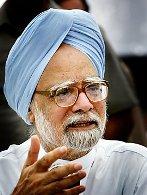 As the country embarked upon setting up new Indian Institutes of Technology (IITs) and Indian Institutes of Management (IIMs) and central universities, Prime Minister Manmohan Singh on Wednesday said attracting the best faculty for these premier institutions remains a problem.
As the country embarked upon setting up new Indian Institutes of Technology (IITs) and Indian Institutes of Management (IIMs) and central universities, Prime Minister Manmohan Singh on Wednesday said attracting the best faculty for these premier institutions remains a problem.
"We must find ways of attracting the best talent as faculty in our premier institutions. We face difficulty in finding top level professors and lecturers in the newly created IITs, Indian Institutes of Science Education and Research (IISERs) and other such institutions," he said.
Addressing the National Education Day function in New Delhi to commemorate the birth anniversary Maulana Abul Kalam Azad, independent India's first education minister, Singh said, "this state of affairs cannot be allowed to prevail".
The government has started major expansion of higher education by opening eight new IITs and 15 central universities.
It has also been decided to set up six IIMs, 10 NITs (National Institute of Technology), 20 IIITs (Indian Institute of Information Technology) and 6,000 model schools during the 11th Plan (2007-12).
Observing that efforts should be made to find ways to improve the quality of teachers, the Prime Minister asked the academics and planners to address this problem of deficiency in the quality of teaching in schools, colleges and universities.
Singh also said the country needed an additional ten lakh teachers to implement the Right to Education Act, which seeks to provide free and compulsory education in the 6-14 age group.
The realisation of Right to Education depended not merely on expansion of the educational infrastructure but importantly on the availability of trained teachers with commitment to the profession, Singh said at the function attended by UNESCO director general Koichiro Matsuura.
The UNESCO chief said India was on track to get most students in schools and achieve 'Education For All', a target set by all countries to be achieved by 2015.
He said the enactment of Right to Education showed the political commitment of the government to ensure that education becomes a right of every child.
Singh said while the outlay for higher education has been increased by ten times in the 11th Plan as compared to the previous plan, the government has launched a new literacy initiative 'Saakshar Bharat' to make 70 million people literate with focus on women's literacy in the next five years.
The government has earmarked Rs 84,000 crore (Rs 840 billion) for higher education in the 11th Plan period.
Noting that a Rs 5,000 crore (Rs 50 billion) National Mission on Education through ICT has been launched recently, the Prime Minister said this will provide Internet connectivity to about 20,000 colleges and educational institutions.
Singh also expressed India's willingness to share with UNESCO the e-learning material prepared by the IITs under this Mission.










 © 2025
© 2025